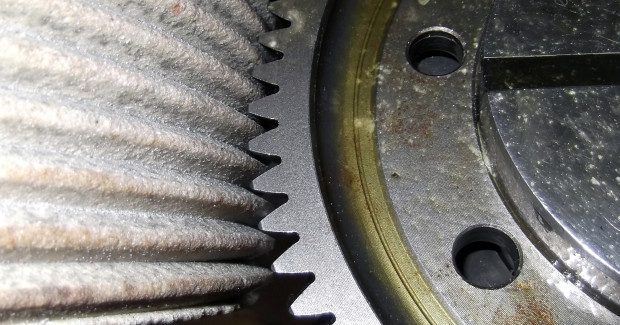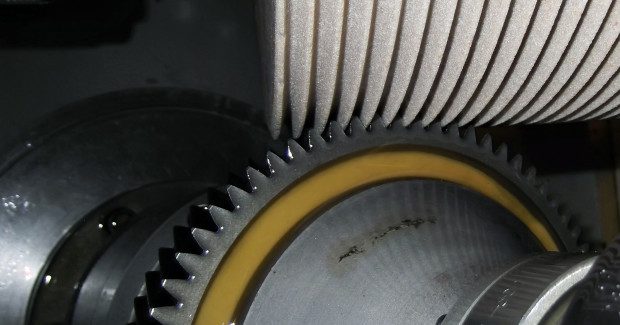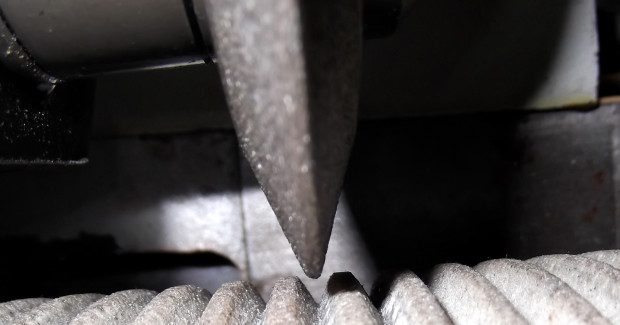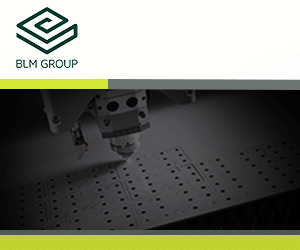Gear Production: Higher Speed, Closer Precision
Automated threaded wheel grinding on gear production machines has now been boosted by an order of magnitude with increased machining accuracy to DIN class 3.
Posted: January 22, 2014
NUM Corporation (Napierville, IL) offers a high performance CNC solution for gear production machines that fully automates threaded wheel grinding. Incorporating unique high speed gear alignment technology that is believed to be an order of magnitude faster than comparable control schemes, the new CNC system dramatically reduces grinding machine threading-in times to accelerate throughput significantly.
This comprehensive new solution is ideal for machine tool manufacturers seeking to improve the performance of their gear production machines, or to help companies expand their gear manufacturing range with threaded wheel grinders.
Based on the new-generation Flexium+ CNC platform, the threaded wheel grinding solution joins the company’s NUMgear suite of gear production software. Originally developed for gear hobbing applications, the capability of this software has been continually extended and now includes solutions for a broad range of gear manufacturing processes, including shaping, grinding and honing, and is used by many of the world’s foremost manufacturers of gear production machines.
The latest addition to the NUMgear portfolio was developed when helping an Asian gear manufacturing machine tool company to improve the performance of a prototype threaded wheel grinder. To improve grinding speed compared with current levels, NUM decided it needed to develop custom technology software. The principal aims were to reduce the time overhead of learning the teeth positions of the hardened gear prior to grinding, and improve the accuracy of the gear grinding process.
Demonstration of a Modul CNC Hobber fitted with NUM Digital CNC and Drives and NUMGear conversational control.
The new system offers a comprehensive CNC solution for gear manufacturing machines. At the heart of the system is a high performance electronic gearbox that allows all master axes – such as the grinding, X, Y and Z axes – and the spindle (C axis) to be fully synchronized. As part of the development work on the new threaded wheel grinder, a major new capability has been added to the gearbox, which is now able to predict the acceleration of axes as well as their speed, in order to minimize synchronization time. Together with the Fast Gear Alignment, it forms part of the new NUMgear threaded wheel grinding application.
During gear production, ‘threading-in’ – the process of bringing the grinding wheel into contact with the gear blank – involves continuously adjusting the position of the grinding wheel relative to the work piece. A similar process is employed when bringing the machine’s dressing wheel into contact with the grinding wheel. Using acoustic emission sensors to learn the sound signatures of a master gear and then using them to control positioning during production runs is a common technique for automating processes like this.
However, the speed and accuracy of the newly-developed Fast Gear Alignment Function eliminates the need for this entirely. As an example, aligning the grinding wheel with a 180 mm diameter gear with 71 helical teeth takes just 0.5 of a second – without any need to acquire acoustic signatures or make manual adjustments.
A second aim of this development required that the gear grinder CNC control should generate gears as accurately as possible. The latest machine from the Asian company produced gears with a tooth profile quality of DIN class 7. During the development process, NUM found that the diamond plated dressing wheel did not come up to specification.
To overcome this problem without incurring major tooling costs, NUM decided to support their customer by helping to modify the technology programs. The positive results of this action far exceeded expectations and the solution can help a machine to consistently grind gear teeth profiles to within 3.5 microns, comfortably achieving DIN class 3 – an improvement of four class levels.
The latest gear grinding development is an example of how NUM customizes its CNC technology for machine makers and supports this with a decentralized R&D structure which locates engineering staff around the world to allow it to work closely with machine builders. In this case, the new gear grinding solution was jointly developed by NUM’s headquarters in Switzerland and the company’s technology center in Chanzhou, China, which is close to many major gear manufacturing machine builders and is currently undergoing major expansion.
“NUM is committed to helping its customers develop market-leading machines through close partnership”, according to Peter von Rüti, the chief executive officer of NUM Group. “Our local presence and willingness to work directly with customers to resolve technical issues very quickly provides both parties with a key competitive advantage.”
NUM is one of the longest established players in the CNC market, having brought out its first numerical controller in 1961. Expansion in Asia has become promising for NUM as Asian manufacturers have progressively improved the capabilities and quality of their machines. To support this development, NUM is currently making significant investments in its Asian infrastructure, including the recent opening of a new regional support center in Seoul, South Korea, and the expansion of its technology center in Chanzhou, which opened in 2010.
von Rüti points out that the European market is promising. “Our ability to create individual solutions for different machines provides medium-sized manufacturers with a huge competitive advantage. The open and flexible nature of our systems and our decentralized development structure, combined with the know-how of our customers, provides unique market opportunities. We welcome the chance to become involved in new projects.”


















